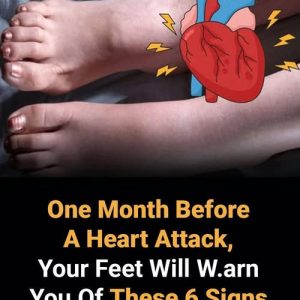
Do you often feel aches, cramps, or tingling in your legs and feet?
These symptoms—especially if paired with swelling or a heavy sensation—can signal poor blood circulation. Left untreated, this can lead to serious problems like blood clots or even heart disease.
According to cardiologist Dr. André Wambier, poor circulation can quietly creep in, especially in older adults or those with heart issues, diabetes, high blood pressure, or a history of smoking. Recognizing the early signs is crucial for getting ahead of potential complications.

5 Signs of Circulation Issues
1. Tingling or Numbness – Especially in the legs or feet after sitting or standing too long, a sign your nerves and muscles may lack oxygen.
2. Cold Feet – Constantly cold feet may mean blood isn’t reaching them efficiently.
3. Leg Cramps While Moving – Pain during walking, also called intermittent claudication, points to oxygen-starved muscles. Nighttime restlessness may also be a clue.
4. Skin Discoloration – Pale, purplish, or brownish patches around the ankles can signal damaged blood vessels and poor healing.
5. Visible Veins – Varicose or spider veins can mean blood is getting stuck due to weakened vessel walls or valves.
If you notice any of these, a visit to your doctor is essential. Simple tests like a Doppler ultrasound can identify the problem early, helping you avoid serious health issues.

4 Essential Vitamins for Better Circulation
Let’s look at four powerhouse vitamins that support circulation, protect vessels, and help your heart.
1. Niacin (Vitamin B3)
Niacin strengthens and relaxes blood vessels, improves blood flow, and helps prevent clots. It also manages cholesterol by lowering LDL (bad) and raising HDL (good). Bonus: it supports brain health and memory.
Get it from: Eggs, chicken breast, salmon, tuna, almonds. Most people can meet their needs through diet. High supplement doses may cause flushing, so only use under doctor guidance.
2. Vitamin C (Ascorbic Acid)
Vitamin C keeps blood vessels flexible and promotes collagen production, which supports arteries and veins. It reduces inflammation and helps relieve heavy legs or restless legs at night.
Find it in: Citrus fruits, strawberries, kiwis, guava, broccoli, bell peppers, spinach. Aim to eat it fresh, and limit supplements to under 2000 mg daily unless prescribed.
3. Vitamin E
This antioxidant helps break up blood clots and protect vessels from free radical damage. It promotes vasodilation—widening of vessels—which improves blood flow and lowers blood pressure.
Best sources: Avocados, almonds, sunflower and pumpkin seeds, spinach, broccoli, egg yolks, and olive oil. Supplements are not usually necessary and may pose risks if overused.

4. Vitamins K1 and K2
Vitamin K1 supports proper clotting—not thinning the blood as some believe. K2 helps prevent calcium buildup in arteries, keeping them flexible and clear. Together, they support overall vascular health.
Get K1 from: Kale, spinach, broccoli, lettuce, arugula, Brussels sprouts, and fruits like kiwi and grapes.
K2 comes from: Eggs, liver, hard cheeses, and fermented foods like natto.
Tip: Since Vitamin K is fat-soluble, pair green vegetables with healthy fats like olive oil or nuts to improve absorption.
Note for those on blood thinners (like warfarin): You don’t have to avoid leafy greens. Just keep your intake consistent so your doctor can adjust your dose properly.
Final Thoughts: Your Health Is in Your Hands
Improving circulation doesn’t require big changes—just consistent, healthy habits. A balanced diet rich in these four vitamins can make a major difference in how your body functions, how you feel, and how well you age.
Take care of your blood vessels, and they’ll take care of you.




